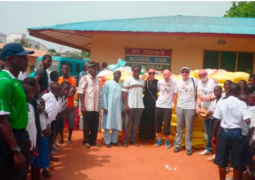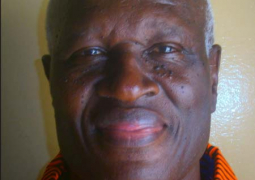The theme for this year’s World Malaria Day “Sustain Gains, Save Lives: Invest in Malaria,” is appropriate as it marks a period of necessary action to maintain the gains and scale up efforts towards achieving near- zero malaria deaths by 2015.
The African Media and Malaria Research Network (AMMREN), a Network of journalists and scientists regards the Day as another opportunity for the global malaria community to take stock of the promises made to end malaria deaths.
About
twelve years ago, 40 African Heads of State made a declaration in
Reduction
of malaria deaths by a third over the last decade in
For that reason, all must support the rallying call of the Roll Back Malaria partnership on World Malaria Day 2012 to “Sustain Gains, Save Lives: Invest in Malaria.”
As the experts say “Whether or not the malaria map will keep shrinking, as it has in the past decade, or be reclaimed by the malaria parasites, depends to a great extent, on the resources that will be invested in control efforts over the next years.”
It also stands to reason that we can cut our losses by tackling the negative factors holding us back in our quest to eliminate the killer disease responsible for an estimated 600 thousand deaths a year, mostly in sub-Saharan Africa.
Powerful stakeholders like the African Leaders Malaria Alliance (ALMA) need to treat fake drug manufacturers and their agents with the same ruthlessness employed against dealers in narcotic drugs.
Obviously, the inability of stakeholders such as drug enforcement agencies, customs officers, the police and drug manufacturing giants to join forces to check this counterfeit problem can lead to a loss of confidence in orthodox medicine and compel people in poor countries to resort to herbal and unconventional solutions whether or not they have been certified to be efficacious.
The fact that even the artemisinin-based combination therapy (ACT) is being faked is worrying indeed.
The continued existence of taxes and tariffs on commodities for malaria control exposes the half-hearted approach to tackle malaria by the very countries susceptible to the disease. Taxes and tariffs make these life-saving products unaffordable to the poor and vulnerable. This is ironic because malaria is a disease of the poor.
If all goes well a malaria vaccine could be available for targeted use as early as 2015. This is a good sign, as the appearance of a malaria vaccine on the scene will go a long way in sustaining the fight against malaria.
However, while the world waits with bated breath for the first malaria vaccine, we must all support ongoing interventions such as the Affordable Medicines Facility for Malaria (AMFm), a brilliant idea to expand access to the most effective treatment for malaria-artemisinin-based combination therapies (ACTs) at an affordable price of a dollar.
Of concern however, is the fact some greedy individuals are looking at the AMFm differently. For example, a recent study published in the Malaria World Journal two months ago shows that the anti-malarial drugs subsidised under AMFm are the new targets for corrupt practices across borders.
Research has revealed that the Global Fund subsidized drugs were being sold in countries where the subsidy programme has not been rolled out, which means that someone stole them from countries like Kenya and Ghana, where the subsidy programme has already been rolled out. The cities where the stolen drugs were found included Addis Ababa, Cotonou, Lomé, Luanda, Lusaka and Maputo.
In order to “Sustain the Gains” in the war against malaria, all stakeholders including the media must remain vigilant in order to crowd out mono-therapies and also educate people on the correct use of treated bed nets and other interventions.
Donor fatigue is now a reality and African governments must respond to the situation and commit more funds to help maintain the gains made against malaria and other tropical diseases.
AMMREN believes that malaria can be „pushed? out of Africa with concerted efforts by all.
As we celebrate World Malaria Day, AMMREN salutes all those working tirelessly to eliminate malaria from Africa.
Let us keep the fire burning!!!!!
ABOUT AMMREN
African Media and Malaria Research Network (AMMREN), was formed in November 2006, and is a network of African journalists and scientists working together to reduce the burden of malaria, which is endemic in most parts of Africa and the number one killer of children under five.
Nineteen print and electronic media journalists from nine African countries formed the network at a media-training workshop on Reporting on Malaria Research in Africa held in Accra-Ghana in 2006, with sponsorship from INDEPTH Network’s Malaria Clinical Trials Alliance (MCTA).
AMMREN now has a membership of over 200 journalists and scientists in ten African countries. The current participating African countries are Burkina Faso, Gabon, Ghana, Kenya, Malawi, Mozambique, Nigeria, Senegal, Tanzania and The Gambia.
Membership is open to all journalists and scientists working in Malaria.




